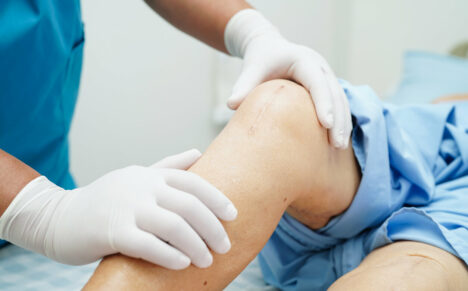No one wants to hear their doctor recommend a second knee or hip surgery after they’ve already had one done already. The time and energy spent recovering, missed work and events, and money spent on the whole procedure and aftermath seems a bit daunting to do all over again.
However, if you are experiencing knee or hip pain after your procedure and the condition is not improving, there may be an issue that requires a revision surgery.
How Can Revision Joint Replacement Surgery Help Me?
You may be wondering why a second surgery would help if the original procedure didn’t work very well in the first place, or if other problems with the joint replacement developed over time. After an examination and some tests, your new orthopedic surgeon will have an idea of what the issue is and can explain why a second surgery could correct the problems that developed or any issues that are left from the first surgery.
If there is a medical professional who can pinpoint your joint condition, it’s an orthopedic surgeon! Orthopedic surgeons are specially trained for years in diagnosing, treating, and preventing conditions and injuries related to the body’s bones, muscles, joints, ligaments, and tendons. The best type of orthopedic surgeon to diagnose and treat problems after joint replacement surgery has special fellowship training to properly address these complicated issues.
Reasons a Joint Revision Surgery Can Help
Below are some reasons why your orthopedic surgeon may recommend a revision surgery.
Infection
One reason why a revision hip or knee surgery may be necessary is if an infection develops. As with any medical procedure, knee and hip surgeries come with a risk of complications, and these can’t always be avoided. While the chances of infection are low, and your surgeon will try their best to prevent it, there is still a very small chance that an infection may develop, either around the time of surgery or in the future.
The best way to treat an infection is to prevent it. Experienced and reputable surgeons use sterilized tools during the procedure, teach the patient about the correct cleaning and dressing of the wound, and prescribe antibiotics to prevent infections from developing.
If an infection spreads to a joint replacement, and it is diagnosed quickly, it is possible to save the replacement by surgically cleaning out the area and receiving a course of intravenous antibiotics. If a chronic infection has been present, appropriate treatment requires taking out the joint replacement to remove the bacteria that have attached to it, treated with intravenous antibiotics, and then reinserting a new joint replacement in the future when the infection is gone. This is called a two-stage revision because it requires a second procedure.
Fracture or Injury
Accidents and injuries can happen, and a common reason for revision hip or knee surgery is an injury or fracture.
While your first surgery may have been successful, the injury can bring on unwanted symptoms and pains, or unstable joints. In situations like these, revision surgery may be recommended to correct the new damage.
Worn Down Joint
Artificial joints and other prosthetics inserted during hip or knee surgery do not last forever. Over time, they can get worn down even through regular use, so it is important to monitor any joint replacement with periodic routine x-rays. This type of preventative maintenance could identify small amounts of wear before any more significant damage develops. Early identification of a potential issue may have a simple solution, while future extensive damage could be more complicated to fix.
If you had your knee or hip replaced several years ago, you may be due for a revision surgery to reduce or eliminate any new pains you are experiencing in that same area. The revision surgery would focus on replacing the existing artificial pieces (prosthetics) with new ones, so your body can continue to be fully functional and as pain-free as possible.
Defective or Damaged Artificial Joint
An uncommon situation where revision knee or hip surgery may be necessary is if the existing artificial piece or prosthetic is defective or breaks. While the success rate of hip and knee replacement surgeries is very high, there are rare situations where an artificial joint is defective or damaged.
It is also possible for a completely functional artificial piece to malfunction several years later. In a situation like this, revision surgery is necessary to either just replace the defective piece, or to redo the entire joint replacement.
Contact an Orthopedic Surgeon in Raleigh Today
If you are looking for a new orthopedic surgeon for a knee or hip condition, be sure to choose one who is board-certified and has a wealth of knowledge and experience. Dr. Brett Gilbert is an expert in hip and knee replacement surgery, and he would be happy to help you with your orthopedic issue.
Call us today at (919) 788-8797 to make an appointment, or you can request an appointment with Dr. Gilbert using our appointment request form, or you can self-schedule your appointment here. Our caring team looks forward to meeting you and helping you live a fuller, more active lifestyle.




